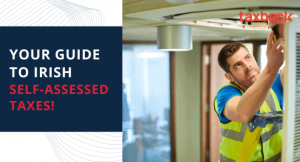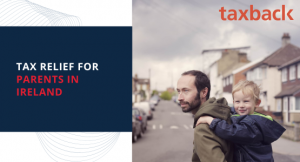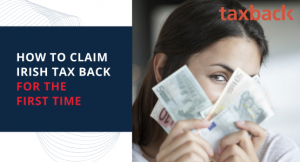Budget 2017 Video and Podcast: All You Need to Know
The budget is in!
Parents, the self-employed and first-time-buyers all seem to fare well in the measures introduced in Budget 2017. We see an increase in funding for early childcare, education and housing, and a rise in the Earned Income Tax Credit. A cut to USC may not be as high as some desire but the only tax increase is the excise on cigarettes. In our Budget 2017 video and podcast, we summarise all the main changes in the budget and how they affect you!
The average Irish tax refund is €1,880
Podcast Transcript
Budget 2017 is in! I'm here with Barry Flanagan and Christine Keily of Taxback.com to discuss the main changes and how they will affect you.
Firstly, can you give us an overview of the measures announced in the Budget?
Christine: Well, the minister certainly painted a very pretty picture today. At the beginning of his speech, he talked about the fact that the economy was in good shape, and he even went on later in the speech to talk about making provisions for a 'Rainy Day Fund', where the plans for the government to set aside funds annually for this purpose from 2019.
Barry: The main point of Budget 2017 was the confirmation this morning that the Budget package - the fiscal space; which is the extra spend that is available, is in the region of 1.3 billion, so that's up from an estimated 1 billion a few weeks ago. So between two and three hundred million has been found down the back of the sofa - that's the rabbit from a hat that Michael Noonan has produced in the last couple of weeks. So the interesting thing about this budget is the split between the extra cash available for investment, and the extra cash available for tax cuts. A two-to-one split had been anticipated, but actually it's come down in a in a three-to-one split in favour of extra investment, which I think has gone down very well with people.
Were there any big surprises in this Budget, or items that had not been discussed in advance?
Christine: Well, I think there were very few surprises in this Budget. Some of the interesting things that we would have noted was that; number 1 - there was no narrowing of the tax base. The minister didn't take anyone out of the tax net in this Budget.
Barry: And nor was there any clawback for lower earners in respect of an additional PRSI charge, or lowering of the threshold for PRSI. So, there shouldn't be anybody who was not paying tax before, who is now paying tax. And similarly, the same number of people will continue to pay tax next year as well. It had been a point that they had been critised for previously narrowing the tax base; reducing the number of people paying income tax. So that trend has stopped.
Christine: We had also expected some talk about PRSI benefits for the self employed. Even if that wasn't going to happen in 2017, we were expecting some mention of it, and that didn't happen today.
What’s happening with USC?
Christine: Well, each of the lower three USC rates are to be reduced by half a percent. That will leave us with a rate of 0.5%, 2.5% and 5%. We will still have the 8%, and the surcharge for the self employed people will stay there.
Barry: And all of the bands have remained the same, with the exception of a very small increase in the entry level point for the 5%. So effectively what you are looking at in terms of the reduction that people will see in the USC that they pay, the extra take home pay they will get; it's capped. The maximum that anybody is going to get, any single person, would be an extra €350 per year, or about an extra €7 per week. Most people, somebody who is in receipt of income of approximately €40,000, they are going to see a smaller, maybe €3-€4 increase. Someone on €50,000 - €60,000 will see a €5 - €6 increase.
Christine: Medical card holders and those under 70 with income of under €60,000 per year will be paying a maximum rate of 2.5%, and Minister Noonan also said that the government is committed to phasing out the USC over time.
What changes are for the self-employed?
Christine: The earned income tax credit for the self employed is to be increased by €400, bringing it to €950 per year, and again, that was well expected.
Barry: If even a slightly larger increase had been expected as well with that, there had been speculation that it would go as high as €1100, so it would seem that rather than introducing the earned income tax credit over a 3 year period, it's probably going to take 4 years for that to be brought up to the same level as the PAYE tax credit.
There are changes in inheritance tax?
Christine: Class A threshold has been increased to €310,000, and we've also seen increases in the other classes by 8%. So that means that group B is going from €30,150 to €32,500, and group C is to go from €15,075 to €16,250.
Barry: So really these increases aren't hugely outside of what was expected. They are quite small in nature, and so no surprises there really. There is an intention as well to continually review these in future years, so we will be anticipating that these thresholds would raise in future years as well.
Capital Gains Tax changes?
Christine: In the area of capital gains tax, the Minister announced revised entrepreneur relief, where we will see a reduction of the current 20% rate of capital gains tax to 10% for qualifying assets, and that will be up to a limit of €1 million in chargeable gains.
Barry: And again, that limit is going to be reviewed in future years. Part of the intention had been to try and bring this in line with the entrepreneur relief which is available in the UK. So they've matched the UK's rate, but they haven't yet match the amount that is subject to that rate, so that again would be an area of future development.
What about the price of Cigarettes and sugary drinks?
Christine: In respect of sugary drinks, a public consultation process is to commence most likely in January, with the additional tax to be introduced most likely in April of 2018.
Barry: And again, that's in line with the Sugar Tax that has been proposed for the UK, that is when the UK fiscal year of course runs April to April, so they will be bringing their's in next fiscal year, then we will seek to mirror that with the introduction of ours in April 2018.
Is there any help for Landlords in this budget?
Christine: There were two positive measures announced in the Budget today for landlords. The first of those being in relation to people who are availing of Rent-a-Room Relief. So currently the level of income that the person can earn from renting a room in their principal private residence, without having an exposure to tax, is €12,000 per year. This is being increased to €14,000 per year with effect from 2017.
Barry: And also then, there's an extra 5% of mortgage interest is now allowable. Previously the amount of mortgage interest you could claim as a deduction from a rental property was 75%, that has increased to 80%, and it has been flagged that it will increase by 5% for the next four years until the full amount of mortgage interest can be used as a deduction in computing your rental profit.
The government announced a help-to-buy scheme. How does that work?
Barry: Details will emerge as this runs, and this is certainly one of the more controversial aspects because the fear is that if you introduce a Help-to-Buy Scheme, all you're really doing is going to increase prices by the amount of it. And certainly, it seems to be quite a substantial one - it was more substantial than people a few weeks ago had anticipated. So, it's capped at €20,000. €20k is the most you're going to get back. It is a tax refund, so you have to have paid that amount of tax over the previous four years in order to get it back. So, it's a rebate. It's based on 5% of the purchase price. It only applies to first time buyers, and it only applies to new builds. So for example, if you have a new build, a new house, that's available at €400,000, then you will be able to claim the full €20,000 tax credit and this can be given to you in the form of a deduction from the deposit that is required. So, what the intention is to incentivise builders to build new houses and then provide first time buyers, who had previously been locked out of the market by virtue of the fact that they couldn't actually afford to build this required deposit - it's to give them a break to try to allow them back in. So you're incentivising the supply side, and you're helping the developers to give them a reason to increase the supply by increasing the number of potential buyers out there.
Christine: And interestingly, this scheme is to be backdated to the 19th July this year and it's due to run until the end of 2019. It is a pity however, that it is not available to second hand properties.
Any other measures for housing?
Barry: Yes, the HRI scheme has been extended for a further two years. So that's the Home Renovation Incentive Scheme, which is a reduction in the amount of VAT that is payable, so that is very welcome news. It's been a very successful scheme, and has previously been extended, so that is very good news for people that will be looking to carry out some home improvements.
Christine: Also, we've heard there today that the Minister is extending mortgage interest relief until 2020, so that is very good news. It was originally due to end in December 2017. For people however who purchased after 2013, there's no extra relief available for them.
Barry: The amount of capital spend as well, the budget that is available for social housing, has been increased as well, so there's €1.2 billion has been allocated over the next 5 years with the intention of providing 47,000 social houses, so that should go some way to addressing the supply side as well.
Do we see any preparations for BREXIT in this Budget?
Christine: Well the Minister announced that Irish/UK trade supports circa 400,000 jobs so the government are certainly taking the BREXIT situation very seriously.
Barry: Yeah, it's the black cloud that has been on the horizon. Really it was a game changer in terms of the mood of the nation, in terms of the outlook for the next three or four years, and it has brought a lot of uncertaincy, so I think that is one of the reasons why we saw that split been new investment and tax cuts which had been thought to be 2-to-1, go out to 3-to-1. I think that that is possibly part of it. That there is an attempt to future-proof in terms of BREXIT. Some specific things that we have again that we've talked about are the sugar tax, which is in-line with the introduction of the sugar tax in the UK, to try not to incentivise individual shoppers to go over the border, no increase in fuel allowance, and so they are very cognisant of the fact that the conditions in the UK could suffer, and we don't want to create any inequalities, or any reason for people to cross the border in the short term.
Christine: Some of the other positive measures announced that also can be very helpful in protecting us into the future, would be retention of the 9% VAT rate for the Tourism & Hospitality industry. And also positive news from the Minister today in relation to the retention of the corporate tax rate at 12.5%.
What measures do we see for healthcare?
Barry: The medical card has been extended to all children in receipt of the domicilliary care allowance, so that's about an extra 10,000 children are going to come in and be covered by the medical card. And in addition then, for the over 70's, the cap at €25 on prescription charges, that has been lowered to €20 per month. That will come into effect on the 1st March 2017, so that's a 20% reduction in the amount that they could incur there.
Christine: In addition, the Minister mentioned that he was going to allocate an additional €15 million to the National Treatment Purchase Fund to reduce waiting lists.
And what about education?
Barry: In terms of education, the Minister announced that the total spend on education is rising to €9.5 billion, which is about 16 or 17 percent of the overall spend, so it's certainly an area that is receiving a huge amount of investment. This is an increase of €458 million on last year's Budget, and a lot of this is geared towards funding recruitment - recruiting additional teachers and teacher support.
Christine: He also mentioned the funding of the higher and further education sector in 2017, with Budget 2017 to see an increase of €36.5 million in this area.
What measures were introduced to help childcare?
Christine: This Single Affordable Childcare Scheme has been announced, and that is to be introduced from September 2017. The idea of this is to provide a means-tested subsidy based on parental income, for children between 6 months and 15 years, and then also universal subsidies for all children between 6 months and 3 years.
Barry: So that's going to help reduce the cost of childcare, which obviously is a huge issue for people, and counter-balancing that for people who raise children in their own home - there is an increase in the Home Carer's Child Credit, from €1000 up to €1100. An increase of €100, which is possibly smaller than had been anticipated, and perhaps is slightly dwarfed by the additional support that will be available for people who have their children in childcare. Of course, I think the reason for that would be they don't want people to lose out by taking an extra job, so the additional incentive seems to geared towards those who will be out working and therefore will have their children in childcare.
Christine: Some may be a bit disappointed by the new childcare scheme because it is limited to people who are using a Tusla registered childcare provider, meaning that people who are relying on family members or childminders in their own home, will not be able to avail of this additional subsidy.
Are there any changes in Pensions and Welfare?
Christine: The state pension is to rise by €5 per week, and I understand that the other weekly social welfare payments will also rise in line with that, by €5 per week.
Barry: This is probably the best flagged measure in the last few weeks and months, and Fianna Fáil have essentially made it a condition of support for the government that they wanted a €5 increase in the State Pension that they could lay claim to, and take credit for. There is some balance has been introduced that it isn't actually going to come into effect until the 1st March, so it is a slightly delayed introduction.
Christine: And also, we should see the 85% Christmas Bonus for social welfare recipients will be paid out in 2016, which is also very good news.
Now that the budget is out, it is a good time to apply for your tax refund with Taxback.com, and how long will it take to get a refund?
Christine: I think that when it comes to the appropriate time to make a tax refund claim, the best message for people out there is, there is no time like the present, so act now, get your application in - the sooner your application is in, the sooner we can get started on it. Generally speaking, we would tell people that it takes approximately 6 weeks from the time the application goes into Revenue, for the refund to actually materialise.
That’s it for the Budget 2017 Podcast!
Thanks to Barry Flanagan and Christine Keily of Taxback.com. I’m Ciara Kennedy. Visit our blog at www.taxback.com to hear all 5 episodes of our Budget 2017 podcast and watch our video summary of the budget.




